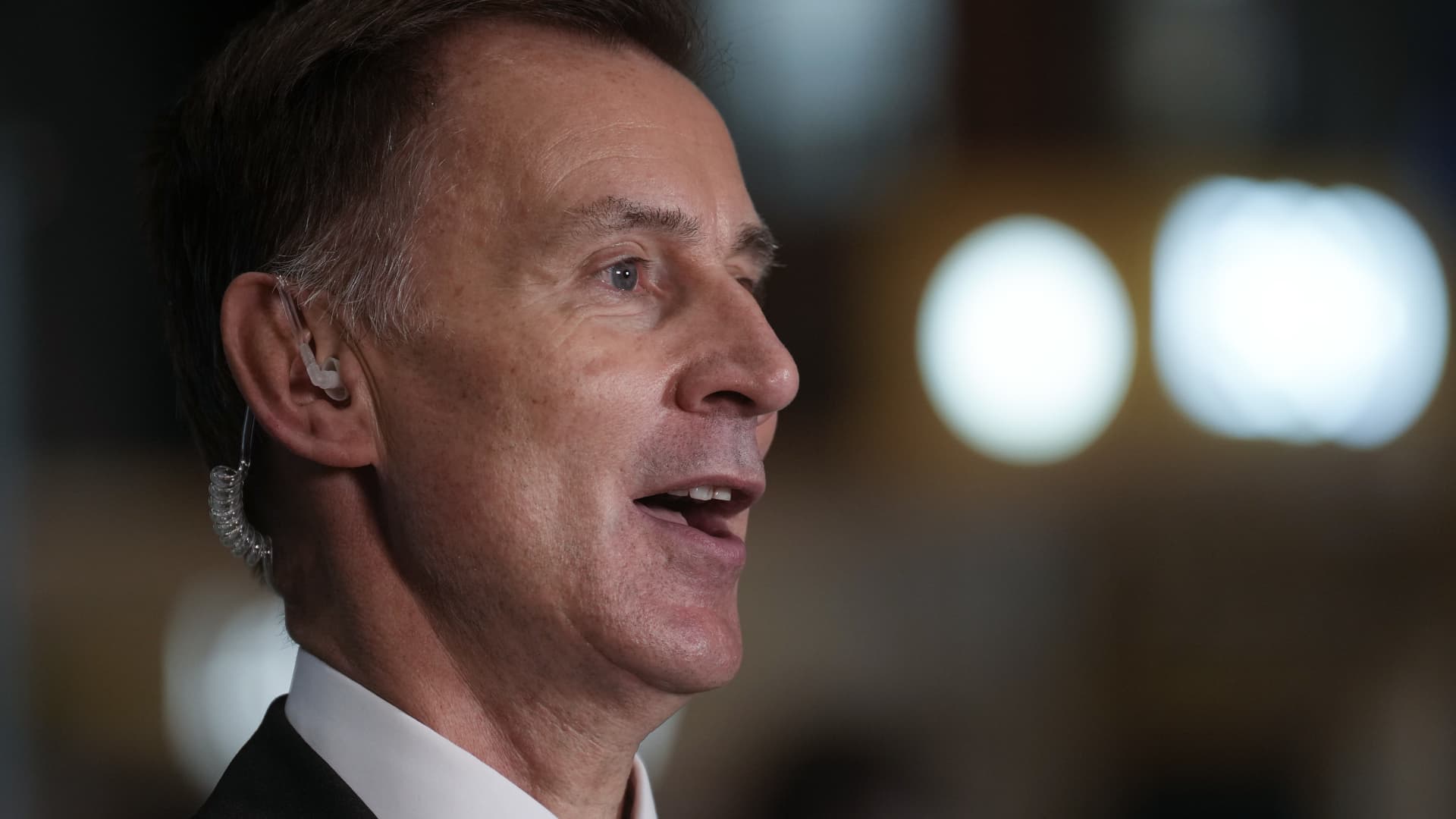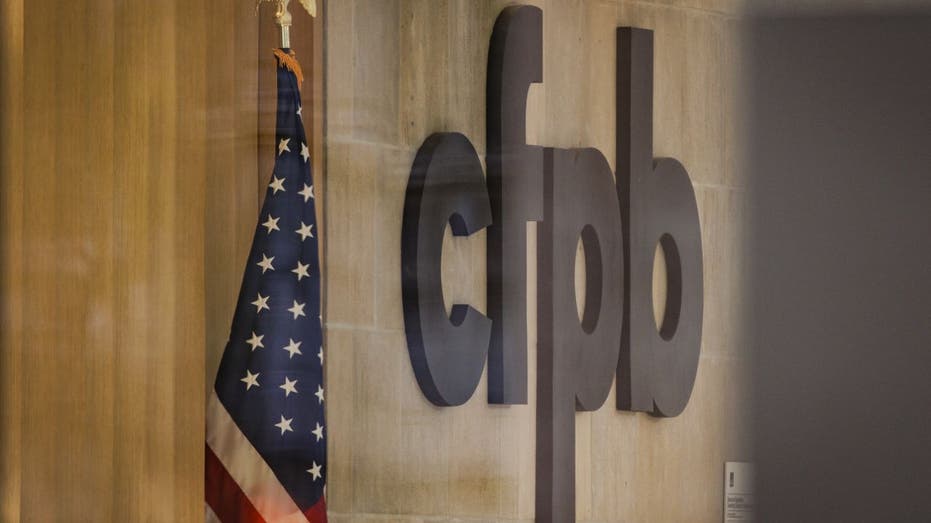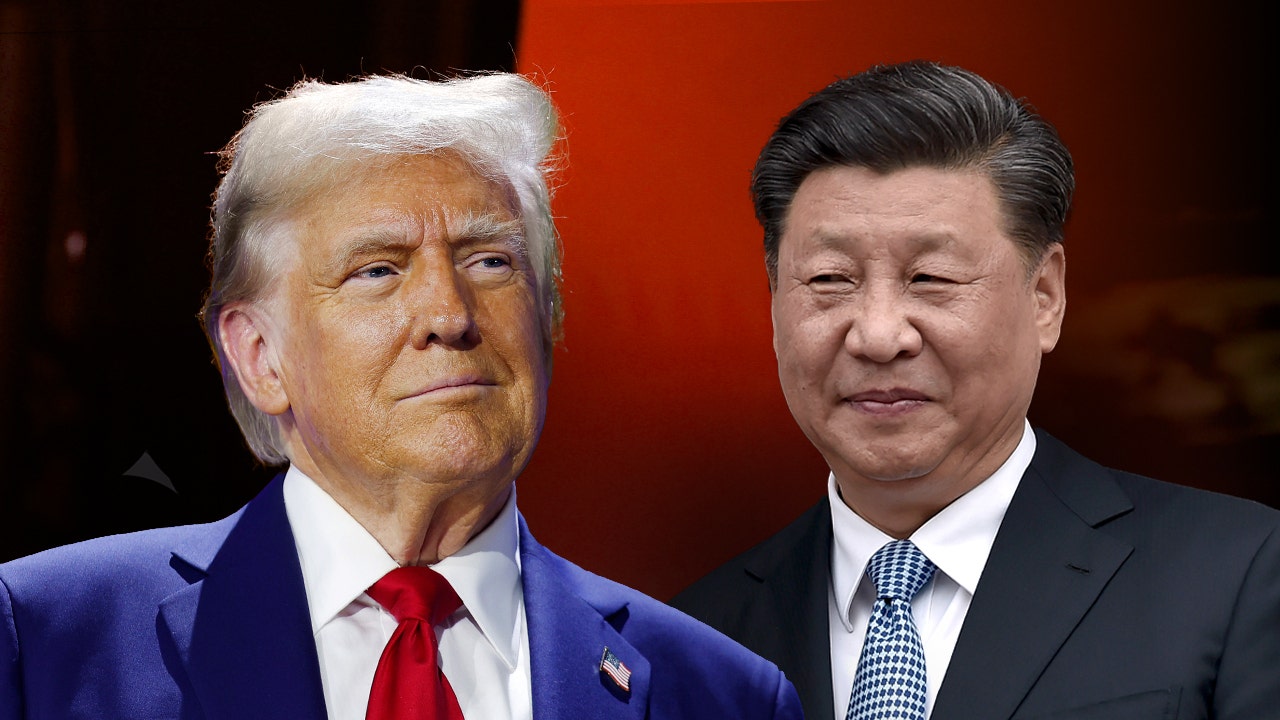Finance
British Finance Minister Jeremy Hunt rules out short-term tax cuts

Jeremy Hunt, Britain’s Chancellor of the Exchequer, speaks on the second day of the the Conservative Party Conference on October 02, 2023 in Manchester, England.
Christopher Furlong | Getty Images News | Getty Images
MANCHESTER, ENGLAND — U.K. Finance Minister Jeremy Hunt on Monday ruled out tax cuts in the short-term, arguing that to reduce them now would be inflationary.
“Right now we’re focused on bringing down inflation,“ Hunt said on the second day of the Conservative Party Conference currently underway in Manchester, England. “The plan is working,” he added. “And now we must see it through, just as Margaret Thatcher did all those years ago.”
Hunt has previously argued that tax cuts are “virtually impossible,” and could only be afforded if the government took some “difficult decisions.”
The comments mark a continuation of the status quo after Hunt was installed last year to steady the ship following then-Prime Minister Liz Truss’ cataclysmic mini-budget. It also signals what may be to come when the chancellor delivers his Autumn Statement next month.
His words come despite clamor from within the ruling Conservative Party to reduce taxes before a General Election next year, when the Tories are set to face a tough battle against the opposition Labour Party.
Truss herself delivered such demands on the fringes of the conference Monday. She called on the chancellor to cut corporation tax back down to 19% from the current 25%, adding “if we can get it lower, the better.”
In an effort to refocus discussions, Hunt unveiled a series of policies including a pledge to raise the national living wage to £11 an hour ($13.40), up from £10.42. The move meets a 2019 manifesto commitment to increase pay for the lowest paid.
“That’s a pay rise for 2 million workers,” he said. “Because if you work hard, a Conservative government will always have your back.”
Hunt also unveiled plans for tougher benefit restrictions in a bid to make savings on the government’s welfare bill. The move is expected to form part of wider plans due to be announced next month to get more people into work.
Additionally, he said he would freeze the expansion of the civil service and implement a plan to reduce staff numbers to pre-pandemic levels.
Fight against inflation
British Prime Minister Rishi Sunak faced flack as the conference kicked off Sunday after telling the BBC that reducing inflation was the best tax cut he could offer.
“Inflation is a tax. It’s a tax that impacts the poorest people the most,” he said. Inflation — the rate at which the cost of goods and services rise — is not a tax, though it can function as such, with higher prices eating into people’s spending power.
Hunt sought to clarify the prime minister’s comments Monday, saying that reducing inflation would be a “boost to incomes,” ensuring that take-home pay is higher than it would be otherwise.
Sunak has positioned halving inflation to around 5% as one of his key priorities for 2023. As of August, U.K. inflation fell to 6.7%, slightly lower than the 7% economists had predicted, signaling that the sharp pace of price rises may be easing.
The fresh data prompted the Bank of England to take a pause in its run of 14 consecutive interest rate hikes, holding rates steady at a 15-year high of 5.25%.
On Friday, data revisions from the Office for National Statistics showed that the U.K. economy bounced back from the Covid-19 pandemic much faster than previously estimated. Britain is no longer the worst performer in the G7, ranking similar to France and stronger than Germany.
“Don’t bet against Britain,” Hunt said, referencing the ONS data. “It’s been tried before and it never works.”

Finance
Shropshire Council asks for urgent government financial support

Shropshire Council has asked the government for urgent financial support to allow it to continue delivering services.
The authority said a detailed review of its budget is expected to reveal it could overspend by £50m if nothing is done and its savings of £34m would not be enough to meet the shortfall.
Unless more money can be found, the council said it would have to issue a Section 114 notice, making it effectively bankrupt.
The council declared a “financial emergency” last month and said it would be “making some difficult decisions over the next few weeks and months to save money and bring more in”.
The Liberal Democrat-run authority said the review, which is due to be published on 10 November, showed “the true scale of the financial challenge”.
If it has to issue a Section 114 notice, the government could then take action to reduce spending through the appointment of commissioners, as it has done in Birmingham.
The council said it had had several conversations with the government about the issue, which were initially focused on “longer-term funding the council needs over the next three years to enable it to invest in transformation, stabilise its budget and bring an end to its financial emergency”.
But the growing budget pressures have since forced the council to ask for emergency funding.
The authority was run by Conservatives until the Liberal Democrats took control in May.
Roger Evans, the councillor responsible for finance, said: “For a number of years now the council has been overspending its budget – a budget that was set by the previous administration.”
He said the council had been using reserves to meet the deficit and there was now “none left for us to use to help us meet this shortfall”.
Evans also said a shortage of government funding over the years had been “contributing hugely to our financial challenge”.
He thanked staff for their efforts to meet the budget shortfall and added: “Despite our challenges, I truly believe that together, we can make Shropshire Council sustainable.”
Finance
Finance Trailblazer Donna Gambrell Receives 2025 Ned Gramlich Lifetime Achievement Award for Responsible Finance

Opportunity Finance Network gives its highest honor to Gambrell for her career-long commitment to expanding economic opportunity in rural, urban, and Native communities through community development finance
WASHINGTON, Oct. 23, 2025 /PRNewswire/ — Last night, Opportunity Finance Network (OFN), the nation’s leading network and intermediary focused on community development investment, presented Donna Gambrell with the 2025 Ned Gramlich Lifetime Achievement Award for Responsible Finance during The Opportunity Honors: Award Ceremony and Reception. The Gramlich Award is the community development finance industry’s highest individual honor recognizing people of distinction and their impact on the community development financial institution (CDFI) industry.
Donna Gambrell receives the 2025 Ned Gramlich Lifetime Achievement Award for Responsible Finance during The Opportunity Honors in Washington, D.C.
As Director of the U.S. Department of the Treasury’s CDFI Fund (2007–2013), Gambrell helped double funding through the flagship Financial Assistance Awards program and launched cornerstone initiatives—including the Capital Magnet Fund, Healthy Food Financing Initiative, and the CDFI Bond Guarantee Program—that expanded the reach of CDFIs nationwide. Following federal service, she joined OFN’s Board of Directors in 2017 and served as Chair from 2020–2024, guiding the network through the COVID-19 response and sector stabilization.
“Donna Gambrell has dedicated her career to expanding economic opportunity for communities long excluded from traditional finance,” said Harold Pettigrew, President and CEO of OFN. “As a trailblazer and fierce advocate, Donna has grown and expanded the organizations she led, helping community development finance to reach more people and underinvested communities. Donna is a titan of the community development finance industry, and the impact of her work can be felt in almost every community across our nation.”
Today, as President & CEO of Appalachian Community Capital (ACC), Gambrell leads a membership network with more than 40 members managing $4 billion in assets and supporting 20,000 regional businesses. Under her leadership, ACC has advanced initiatives such as Opportunity Appalachia—helping 80+ communities raise over $160 million for priority projects—and launched the Green Bank for Rural America to catalyze climate-smart investment in rural markets.
“Local communities know what they need to best support themselves, and CDFIs put the power back in their hands,” said Gambrell. “That’s what first drew me to community development finance; watching communities thrive and people build generational wealth because of CDFIs is what continues to inspire me many years later. It is an honor to receive the Gramlich Award, and I am grateful to my peers for this recognition of my career.”
Gambrell was also the first African American woman to lead the CDFI Fund—an important accomplishment that underscores a career defined by durable institutional achievements and industry-wide impact.
“Not only is Donna Gambrell a tireless champion for equitable community and business development, but she is a mentor and role model to so many in the industry,” said Darrin Williams, CEO of Southern Bancorp, Inc. “Donna brings people together to help advance community development finance and bolster connections to support communities across all areas of the country. I am proud to call her a colleague, friend, and inspiration.”
About the Ned Gramlich Lifetime Achievement Award for Responsible Finance
Established in 2007, the Ned Gramlich Lifetime Achievement Award for Responsible Finance is the community development finance industry’s highest individual honor. It is awarded annually at OFN’s Annual Conference to individuals whose careers exemplify leadership, integrity, and a deep commitment to expanding economic opportunity.
The spirit of the award is to celebrate people of distinction who have produced a body of work that sets them apart within the CDFI industry. These individuals have shaped the field through innovation, institution-building, and a relentless focus on impact—leaving a legacy that continues to influence the sector and the communities it serves.
The award is named for Ned Gramlich, a staunch, longtime advocate for responsible finance. As the former Board of Governors’ primary liaison to the Federal Reserve’s Consumer Advisory Council, Gramlich advised on community development and consumer finance policy matters. He was an outspoken voice against predatory lending and a strong defender of the Community Reinvestment Act. He served on the OFN Board of Directors from October 2006 until his death in 2007.
About Opportunity Finance Network
Opportunity Finance Network (OFN) is the nation’s leading network and intermediary focused on community development investment, managing more than $1 billion in total assets and a membership of more than 490 community development financial institutions (CDFIs), which includes community development loan funds, credit unions, green banks, banks, minority depository institutions, and venture capital funds. Our network of CDFIs works to ensure communities left behind by mainstream finance have access to affordable, responsible financial products and services, with a deep focus on serving rural, urban, and Native communities across the United States. OFN is a trusted investment partner to the public, private, and philanthropic sectors – foundations, corporations, banks, government agencies, and others – and, for more than 40 years, has helped partners invest in communities to catalyze change and create economic opportunities for all.
Since its founding in 1986, OFN members have originated $124 billion in cumulative financing, helping to create or maintain nearly 3.4 million jobs, start or expand more than 1 million businesses and microenterprises, and support the development or rehabilitation of more than 3 million housing units and more than 15,000 community facility projects.
SOURCE Opportunity Finance Network
Finance
State treasurers push CFPB on third-party financial data access rule

Rep. Byron Donalds, R-Fla., on his bill to eliminate the Consumer Financial Protection Bureau, Elon Musks directive to federal workers over documenting work, Congress budget reconciliation process and his political future.
A dozen state financial officers are writing to the Consumer Financial Protection Bureau (CFPB) to uphold consumers’ right to share financial data with authorized third parties as the agency weighs a rule that could restrict their ability to do so, according to a letter exclusively reviewed by FOX Business.
The CFPB is considering revising a regulation under section 1033 of the Dodd-Frank Act, which would revise the definition of a “representative” who makes a request on behalf of the consumer, as well as how to assess fees to cover costs incurred by a covered person responding to a customer request.
Twelve state financial officers — including nine treasurers, two auditors and one controller — wrote in favor of the rule recognizing consumer-authorized third parties as “representatives” while preserving existing authorization and conduct requirements.
They wrote that Section 1033 gives consumers a right to access their financial information upon request and that the rule includes agents, trustees or representatives acting on their behalf, including those who aren’t fiduciaries, upon the consumer’s authorization, which is the “touchstone” of the process that needs to be preserved.
KEY GOP LAWMAKERS BACK TRUMP’S EXECUTIVE ORDER FOR CRYPTO, OTHER ALTERNATIVE ASSETS IN 401(K) PLANS
A dozen state financial officers are arguing for the CFPB to preserve the ability of consumers to authorize non-fiduciary representatives to access their data. (Anna Moneymaker/Getty Images)
“Preserving this interpretation promotes competition and innovation (including for real-time payments, budgeting tools, alternative credit assessment, AI, and crypto) and it reduces the risks of debanking and market concentration,” the financial officers wrote.
“In contrast, narrowing ‘representative’ would harm consumers by reducing choice and entrenching incumbents — outcomes counter to Section 1033’s competitive purpose,” they explained.
The group of state financial officers wrote that the CFPB should affirm the text of the rule by clarifying that a consumer-authorized third-party qualifies as a representative acting on their behalf.
SEC CHAIR WANTS PRIVATE MARKET INVESTMENTS AVAILABLE FOR AMERICANS’ 401(K) PLANS

The CFPB’s proposed rule is revising regulations under the Dodd-Frank Act. (Samuel Corum/Bloomberg via Getty Images)
They also wrote the definition of “representative” shouldn’t be limited to fiduciary relationships as it’s not required by the text and would “unduly restrict consumer choice.”
“Consumers should be able to exercise their Section 1033 rights directly or through an authorized representative of their choosing. A text-faithful interpretation of ‘representative’ sustains competition and innovation and reduces risks of debanking and market concentration,” the state financial officers explained.
State financial officers who signed onto the letter include Kansas Treasurer Steven Johnson, Kentucky Treasurer Mark Metcalf, Mississippi Treasurer David McRae, Nebraska Auditor Mike Foley, Nebraska Treasurer Tom Briese, Nevada Controller Andy Matthews, North Dakota Treasurer Thomas Beadle, Ohio Treasurer Robert Sprague, South Carolina Treasurer Curtis Loftis, Utah Auditor Tina Cannon, Utah Treasurer Marlo Oaks and Wyoming Treasurer Curt Meier.
ANTI-WOKE GROUPS IN US AND FRANCE JOIN FORCES TO COMBAT DEBANKING AND CORPORATE IDEOLOGICAL POLICIES

The state financial officers want to ensure consumers can authorize a third party to look at their financial data. (Yuki Iwamura/AFP via Getty Images)
The public comment period for the CFPB’s rule closed on Tuesday night and the rule attracted nearly 14,000 comments.
Sen. Cynthia Lummis, R-Wyo., sent a letter to the CFPB in support of open banking policies as the agency considers the rule, while consumer groups have also weighed in.
“Major financial institutions are attempting to consolidate their power and maintain monopolistic control over consumer data,” Will Hild, executive director of Consumers’ Research, said in a statement.
GET FOX BUSINESS ON THE GO BY CLICKING HERE
“If these major banks are allowed to continue to control access to consumer data, they will have even greater leverage to punish Americans for their beliefs and to coerce compliance with their radical left-wing ideology.”
-

 World4 days ago
World4 days agoIsrael continues deadly Gaza truce breaches as US seeks to strengthen deal
-

 News3 days ago
News3 days agoVideo: Federal Agents Detain Man During New York City Raid
-

 Technology4 days ago
Technology4 days agoAI girlfriend apps leak millions of private chats
-

 News3 days ago
News3 days agoBooks about race and gender to be returned to school libraries on some military bases
-

 News4 days ago
News4 days agoTrump news at a glance: president can send national guard to Portland, for now
-

 Business4 days ago
Business4 days agoUnionized baristas want Olympics to drop Starbucks as its ‘official coffee partner’
-

 Politics4 days ago
Politics4 days agoTrump admin on pace to shatter deportation record by end of first year: ‘Just the beginning’
-
Science4 days ago
Peanut allergies in children drop following advice to feed the allergen to babies, study finds

















